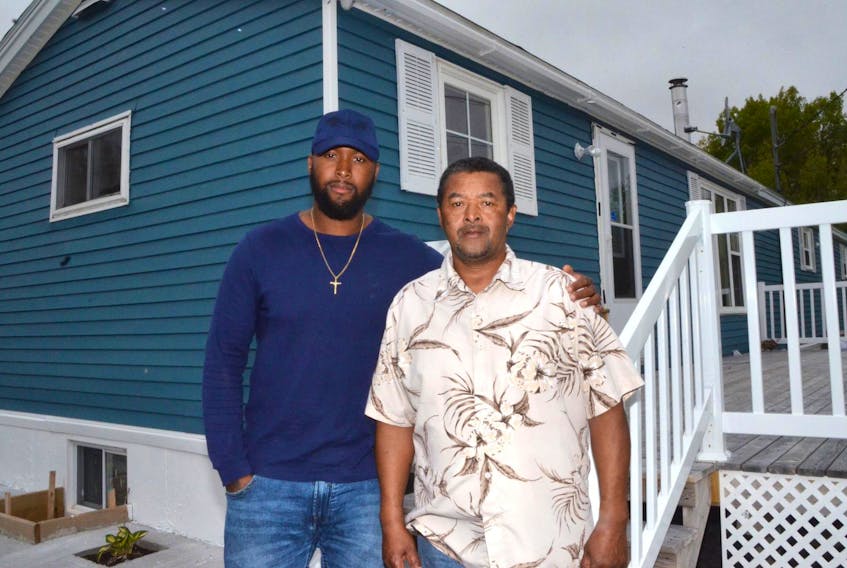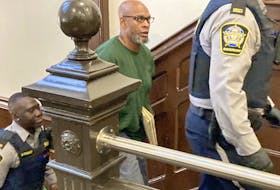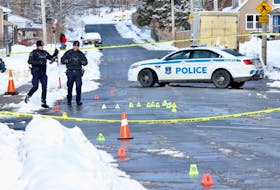Ricky Borden tried buying the expensive primer and paint.
But four coats wouldn’t cover the blood on the ceiling.
He patched the bullet holes in the walls, tore up the blood-soaked hardwood flooring in the living room and replaced kitchen tiles.
When they bought the mobile home in 1989 it was a place to raise a family.
On Jan. 3, 2017, it became the house in which their son-in-law, Afghan war veteran Lionel Desmond, killed their daughter, granddaughter and his own mother before turning the gun on himself.
“Now it’s a prison,” said Borden of the house they can neither sell nor afford to leave.
“It’s hell.”
As this province waits for the Desmond Inquiry to uncover how the institutions that sent a happy-go-lucky young man off to war failed him when he came home, a cruel reality abides in Upper Big Tracadie.
Those same institutions that failed Lionel Desmond in life are now refusing to take responsibility for the wreckage he left behind.
For two years Sheldon Borden has been fighting with his own employer, the Canadian Armed Forces, and Veterans Affairs Canada to get them to take care of his parents.
“I’m young, I can work, I don’t want a cent,” said Sheldon.
“My parents aren’t looking for some big payout. But there’s no way in hell a woman my mother’s age and with her health troubles should be slaving in a restaurant because she’s afraid of being in her own home at night.”
Ricky and Thelma Borden can’t sell their house because no one wants to live in a place where such horror took place.
They can’t afford to move.
Despite the new paint and flooring, which they paid for and installed themselves, the house constantly haunts what few moments of peace they manage to find.
And every government department — from Veterans Affairs, to his own employer and its ombudsman — that Sheldon has contacted to help his parents has so far refused.
“When people came home they used to stay with us. No one comes by much anymore."
- Thelma Borden
“In your dreams, you keep trying to rewrite the story,” said Thelma, sitting in the same impeccably neat living room in which her daughter and granddaughter were murdered.
“What if Aaliyah went out the back door? You’re writing it in your head that she’s running down the yard but then she’s laying in the yard instead.”
Hearing his mother, Sheldon looked to her and said, “You have those dreams too?”
To appreciate the reality the Borden family is living today, you need to know who they are.
So we’ll go back to 1989, when Ricky and Thelma came home from working in Toronto to raise their family in a new mini-home across a rural Guysborough County road from the house in which she had grown up.
Upper Big Tracadie and nearby Lincolnville form a close-knit community of largely African Canadian residents. It’s surrounded by communities of other marginalized groups – Acadian, First Nations and Irish – who were pushed to the unfertile land English and Scottish settlers hadn’t wanted.
Thelma, like many other members of her generation, was born in her home at the hands of a local midwife instead of at the largely white hospital in Antigonish.
Coming home was what the Bordens expected and wanted for their children.
Job opportunities were fewer, but they are an industrious pair – Thelma opened a beauty salon on Main Street in nearby Antigonish and Ricky always found work.
More importantly, their little house was filled with life.
Their own three children and nieces and nephews filled its walls with the sounds of play.
In the evenings there’d be guitars and singing for the constant stream of visitors.
Thelma kept spare bedrooms ready for guests.
“When people came home they used to stay with us,” said Thelma.
“No one comes by much anymore. I’ve got beds made downstairs and an extra bathroom.”
One of those constant visitors was Lionel Desmond, who’d make the long walk to their home to help Ricky with projects and spend time with Shanna.
Thelma and Ricky knew it was their daughter he was really coming to see and they approved.
“He was a helpful young fella; he’d do anything for you,” Ricky said of Lionel.
“I liked him.”
Shanna had always talked of becoming a nurse but instead went to beautician school.
“She did that for her mother,” said Ricky.
“She was lovely — always thinking of other people.”
With few opportunities in Upper Big Tracadie for a young man, Ricky drove Lionel to Sydney three times so he could enlist in the military.
The area has always provided a disproportionate number of young men to serve a country whose institutions often weren’t so kind in return.
Despite having no more than 250 people at the time Lincolnville sent 19 soldiers to fight in the First World War.
The community’s students went to a segregated school until 1984.
Sheldon himself joined, and continues to serve, as an air force supply technician.
Desmond came home from a tour on the front lines of the Afghan war with the 2nd Battalion Royal Canadian Regiment a changed man.
“The impacts that affects me the most are the smells of dead bodies in front of me,” stated Lionel Desmond in a handwritten letter to the Veterans Appeal and Review Board.
“. . . I seen dead/wounded people and now it plays back in my head; their memories are there. I love my country but how do I find the answer to all what’s haunting me. My wife and myself can’t even talk right to each other. I snap if anger is lashed out. I have been disturbed from sleeping and I have problems sleeping in the same bed as my wife. We have separate beds and I have trouble expressing myself.”
Desmond’s struggles with post-traumatic stress disorder and the support he did and didn’t receive will be the subject of the inquiry for which a start date has yet to be set.
In the decade after Lionel’s return from Afghanistan, Shanna went back to school, got a nursing degree and started working at St. Martha’s Regional Hospital in Antigonish.
Shanna, Lionel and Aaliyah were staying at Ricky and Thelma’s house while the latter pair were staying with their other daughter in Regina, where Ricky was working as a truck driver.
“I can’t help but feel that that a little black community in Guysborough is not significant to them (government).”
- Sheldon Borden
After Christmas 2016, Lionel and Shanna drove Ricky to Halifax.
They spent the night before his flight West at Sheldon’s.
“We had a great time, drinking and carrying on,” said Ricky.
Eight days later a friend called and told him what had happened.
He threw the phone against the wall.
They were on the next flight home.
An RCMP officer in the driveway wouldn’t let them into the house.
That didn’t work on Sheldon.
“Something like that happens to your family and some little ass cop isn’t going to stop you,” said Sheldon.
He can’t unsee what he saw in his parents’ house.
But the lack of attention he says his family has received from Veterans Affairs Canada adds insult to injury.
It’s an insult that Sheldon feels smacks of the continuing mistreatment his African Canadian community has historically suffered from.
“I can’t help but feel that that a little black community in Guysborough is not significant to them,” said Sheldon.
“I had people in basic training call me a ‘nigger.’ I had someone on the HMCS St. John’s knock over pans and say, ‘I’m not serving that nigger.’ In the military you are taught that you are all part of this family, so you keep your mouth shut and you keep waiting for someone to stand up for you.”

The Department of Veterans Affairs refused to pay for the funerals of Shanna, Aaliyah and Brenda Desmond until Sheldon went public with the media.
“In the military we joke that we’re all dogs,” said Sheldon.
“But if I have a dog and he attacks you, then I am liable for the damage it has done. So why is the government not liable for the continuing trauma they are inflicting on my family.”
In this view he has the support of Halifax-based human rights advocate Raymond Shepherd.
“The government and the military have not shown one iota of compassion for this family,” said Shepherd, who joined Sheldon for the interview and is writing government agencies on the family’s behalf.
The area’s federal representative, Cape Breton-Canso MP Rodger Cuzner, said he only learned of the Borden’s situation and government’s repeated refusals to help when contacted by The Chronicle Herald.
“This is obviously a unique situation,” said Cuzner.
“But I would hope that senior officials will see this unique case and help with this grieving family … So let’s try to use a little bit of common sense and try to find a resolution.”
Cuzner isn’t running for re-election and said with the federal election campaign underway, government institutions are largely on autopilot, but that in the time he has left in Ottawa he will arrange meetings and push for some form of compensation for the Borden family so they no longer have to live in the house.
Meanwhile the Bordens struggle on, long day through long day.
After surgeries for lung cancer and a thyroid disorder, Thelma opened Big Momma’s restaurant in nearby Monastery.
“It’s to keep us busy, keep us out of the house,” said Ricky.
Wednesdays through Sundays, Ricky and Thelma go to the restaurant in a former post office around 7:30 a.m. to prep for the pizza, fish and chips and burgers that are their main fare. They don’t leave until 10 p.m. most nights.
Mondays and Tuesdays they deal with life’s responsibilities and try to stay out of the house.
On Tuesday past, Ricky was cleaning out a shed in anticipation of a hip surgery that will lay him up for three months.
With Thelma running the restaurant, Ricky can expect to be alone in the house for long hours.
Sheldon has to go back to work at Shearwater and has his own mental health and four children to worry about.
“I’m not worried about myself and I don’t want pity,” said Sheldon.
What he wants is for the country he and his brother-in-law served to look after his parents.
It’s not that a new house would allow them to heal.
It’s not that some sort of settlement for their pain and suffering would allow them to work less.
“They need to keep busy,” said Sheldon.
“Our family will never be whole again.”
But knowing Ricky and Thelma weren’t afraid to go home at night would be one less worry on his troubled mind.
The Department of Veterans Affairs declined to comment, citing privacy concerns.
RELATED:









